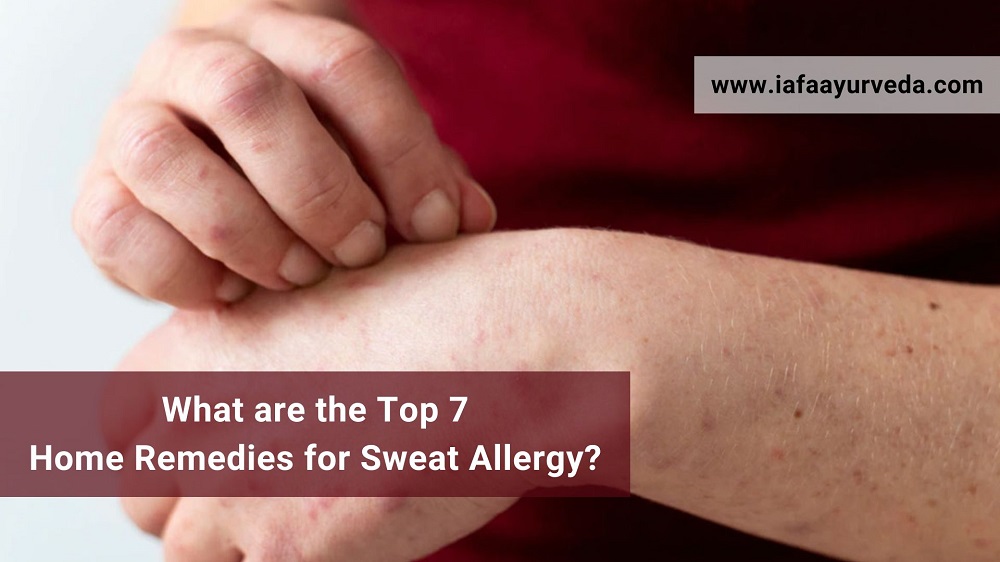A sweat allergy is an aggravation of atopic dermatitis caused by an increase in sweat production as a result of a raised body temperature. It manifests as little reddish welts that form in reaction to increasing body temperature and sweat output. It can impact people of all ages. Sweating can cause cholinergic urticaria, which is characterized by acute itching. The allergy is caused by an allergy-producing protein released by microorganisms on the skin, not by the sweat itself.
Cholinergic urticaria (CU) is a type of physical urticaria (hives) that occurs as a result of sweating, such as after exercise, bathing, emotional stress, or remaining in a hot environment. The hives created are typically smaller and have a shorter lifespan than traditional hives.
Symptoms of Sweat Allergy
Following are symptoms you may see while having a sweat allergy:
- Excess saliva in your mouth
- Headache
- Diarrhea
- Shortness of breath
- Low blood pressure
- Fast heartbeat
- Stomach cramps
- Dizziness
Causes of Sweat Allergy
Hot and humid weather, which causes profuse perspiration and blocked eccrine sweat glands, is the most prevalent cause of a sweat allergy. When these glands become blocked, perspiration leaks out onto a person’s skin, causing sweat hives. Underdeveloped sweat glands, which are a major cause of this type of infection in babies, and being overweight are two more causes.
Ayurvedic Treatment of Sweat Allergy
Sweat allergies, according to Ayurveda, are caused by a lack of digestion. This digestive system problem causes hypersensitivity to specific chemicals such as pollen and dust, which triggers allergic reactions. As a result, anytime a person is exposed to allergens, the doshas are altered (become imbalanced), and toxins are generated as a result of the imbalanced doshas, resulting in vivid symptoms. If the pitta dosha is disturbed, for example, it will emit a heated toxin that accumulates in deep tissue such as nutritive plasma (Rasa), blood (Rakta), muscles (Mamsa), and lymphatic tissue (Lymphatic) (Lasika). Toxins like this evolve an origin of contamination in more profound tissues, resulting in a variety of sweat allergy symptoms.
Home Remedies for Sweat Allergy
Because heat is so frequent, there are several options for treating the symptoms of sweat allergy. However, while those methods may be simpler, they may not be as effective in swiftly alleviating the condition’s symptoms. So, to assist you, here are some great home remedies for sweat allergy:
1. Aloe Vera Gel
- Aloe vera gel’s antibacterial and antiseptic features aid in the reduction of a variety of skin rashes, including those produced by sweat allergy. It will aid in the reduction of inflammation as well as the reduction of redness. It softens and hydrates the skin while also protecting it from dryness.
2. Sandalwood
- This is a tried-and-true treatment for sweat allergy. To treat allergies mix sandalwood powder with full-fat, chilled milk and apply it as a pack to the skin. Rinse with cold water. Sandalwood is a very helpful product that protects you from harmful UV rays. Sandalwood’s natural oils also aid in the removal of a sun tan.
3. Chickpea Flour
- Chickpea flour pack, often known as gram flour, is a skin cleanser. It exfoliates the dead skin cells and eliminates the pollutants that block the pores. The irritating and prickling sensation will be relieved with this home remedy.
4. Oatmeal
- Oatmeal is a good skin exfoliant and aids in the removal of blocked sweat ducts. It calms irritated skin and relieves allergies and irritation.
- Take an oatmeal bath and gently scrub the afflicted regions with it. Repeat this three times a week for effective results.
5. Neem
- Neem is a powerful antibacterial and anti-inflammatory herb used to treat a variety of skin ailments, including sweat allergies. Combine both neem powder and water to form a paste. Apply this mix to your affected area.
- After a few minutes of application, rinse it off.
6. Lavender Essential Oil
- Lavender oil is soothing and therapeutic, and it also has antibacterial properties. It will relieve itching and irritation while also preventing hazardous bacteria. Mix the essential oil with tepid water thoroughly.
- To relieve allergies, take a bath with this water.
- You can also dab lavender essential oil on the affected area with a towel dipped in cold water possessing this essential oil.
7. Greek Yogurt
- Yogurt soothes and cools sore or swollen skin. It also unclogs pores and aids in the rapid healing of rashes. Apply chilled Greek yogurt to the hives directly.
- Allow the yogurt to sit for 10 to 15 minutes.
- Using ordinary water, rinse it off.
Conclusion
Consult an Ayurveda professional available at IAFA® before trying these home remedies. IAFA® is a prominent Ayurvedic institute specializing in the treatment of all types of allergies.




